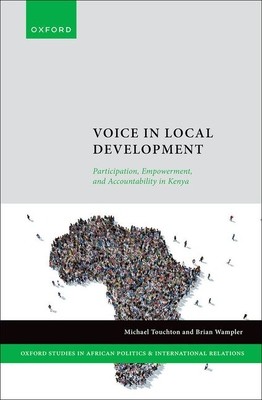
- We will send in 10–14 business days.
- Author: Brian Wampler
- Publisher: Oxford University Press
- ISBN-10: 0198930593
- ISBN-13: 9780198930594
- Format: 15.6 x 23.4 x 1.9 cm, hardcover
- Language: English
- SAVE -10% with code: EXTRA
Reviews
Description
Many governments in semi-democratic regimes have adopted participatory democratic institutions to promote development and accountability. But limited resources, weak civil society, and a history of authoritarian politics make building subnational democratic institutions daunting. This book addresses several important questions surrounding participatory democratic institutions: do participatory institutions expand accountability, empower citizens, and advance development in these environments? Through administering a survey with embedded experiments surrounding citizens' development policy preferences to over 11,000 respondents in five Kenyan counties, Touchton and Wampler collect parallel qualitative data through participant observation and over 80 elite interviews and find limited evidence for transformative change from Kenyan PB.
This book makes several contributions to advance academic and policy debates on participatory institutions and their impact on governance, accountability, democracy. First, it identifies the vital importance of competitive elections within representative democracy to empower citizens and CSOs as part of the broader causal chain leading to improvements in governance, accountability, and democracy. Next, it develops arguments for how three factors--a new socio-political context, changes to core operational rules, and different configurations of PB actors--interact to influence how PB programs function. Finally, it helps policymakers by redefining the parameters of the types of outcomes that are likely to emerge from new PB programs. This approach will be widely read among policymakers in national and local governments, international organizations, such as the World Bank, DFID, USAID, and international advocacy organizations. Oxford Studies in African Politics and International Relations is a series for scholars and students working on African politics and International Relations and related disciplines. Volumes concentrate on contemporary developments in African political science, political economy, and International Relations, such as electoral politics,democratization, decentralization, gender and political representation, the political impact of natural resources, the dynamics and consequences of conflict, comparative political thought, and the nature of the continent's engagement with the East and West. Comparative and mixed methods work is particularly encouraged. Case studies are welcomed but should demonstrate the broader theoretical and empirical implications of the study and
its wider relevance to contemporary debates. The focus of the series is on sub-Saharan Africa, although proposals that explain how the region engages with North Africa and other parts of the world are of interest. Series Editors: Nic Cheeseman (University of Birmingham), Peace Medie (University of
Bristol), and Ricardo Soares de Oliveira (University of Oxford)
EXTRA 10 % discount with code: EXTRA
The promotion ends in 17d.18:59:10
The discount code is valid when purchasing from 10 €. Discounts do not stack.
- Author: Brian Wampler
- Publisher: Oxford University Press
- ISBN-10: 0198930593
- ISBN-13: 9780198930594
- Format: 15.6 x 23.4 x 1.9 cm, hardcover
- Language: English English
Many governments in semi-democratic regimes have adopted participatory democratic institutions to promote development and accountability. But limited resources, weak civil society, and a history of authoritarian politics make building subnational democratic institutions daunting. This book addresses several important questions surrounding participatory democratic institutions: do participatory institutions expand accountability, empower citizens, and advance development in these environments? Through administering a survey with embedded experiments surrounding citizens' development policy preferences to over 11,000 respondents in five Kenyan counties, Touchton and Wampler collect parallel qualitative data through participant observation and over 80 elite interviews and find limited evidence for transformative change from Kenyan PB.
This book makes several contributions to advance academic and policy debates on participatory institutions and their impact on governance, accountability, democracy. First, it identifies the vital importance of competitive elections within representative democracy to empower citizens and CSOs as part of the broader causal chain leading to improvements in governance, accountability, and democracy. Next, it develops arguments for how three factors--a new socio-political context, changes to core operational rules, and different configurations of PB actors--interact to influence how PB programs function. Finally, it helps policymakers by redefining the parameters of the types of outcomes that are likely to emerge from new PB programs. This approach will be widely read among policymakers in national and local governments, international organizations, such as the World Bank, DFID, USAID, and international advocacy organizations. Oxford Studies in African Politics and International Relations is a series for scholars and students working on African politics and International Relations and related disciplines. Volumes concentrate on contemporary developments in African political science, political economy, and International Relations, such as electoral politics,democratization, decentralization, gender and political representation, the political impact of natural resources, the dynamics and consequences of conflict, comparative political thought, and the nature of the continent's engagement with the East and West. Comparative and mixed methods work is particularly encouraged. Case studies are welcomed but should demonstrate the broader theoretical and empirical implications of the study and
its wider relevance to contemporary debates. The focus of the series is on sub-Saharan Africa, although proposals that explain how the region engages with North Africa and other parts of the world are of interest. Series Editors: Nic Cheeseman (University of Birmingham), Peace Medie (University of
Bristol), and Ricardo Soares de Oliveira (University of Oxford)


Reviews